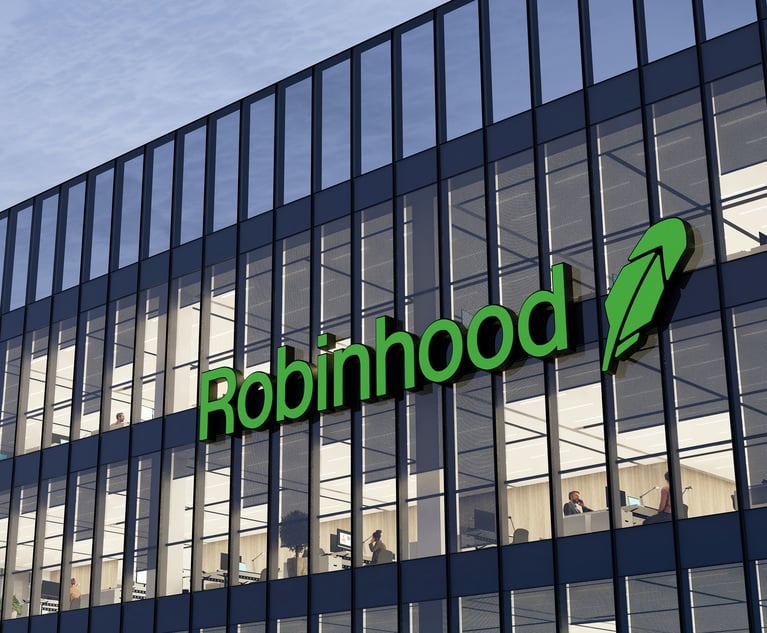
With CCPA Approaching, Companies Still Struggling With GDPR Data Requests
Some companies are still struggling to comply with the right of access granted by the GDPR, but a similar provision may yield an even greater number of data subject access requests under the CCPA.
December 04, 2019 at 09:30 AM
4 minute read
The original version of this story was published on Legal Tech News
The California Consumer Privacy Act (CCPA) and its right of access are less than a month from coming into effect on January 1, 2020. However, the 2019 Compliance Benchmark Report from data solutions provider Talend indicates that many companies may still be struggling with a similar provision as it exists under the EU's General Data Protection Regulation (GDPR).
Whether or not this spells trouble for the ability of companies to respond to data subject access requests made under the CCPA may depend less on an entity's proficiency with the GDPR and more on the cultural differences between the U.S. and EU.
Talend surveyed 103 companies worldwide operating in various industries that include financial services, media, the public sector and education. One major takeaway was that 58% of respondents were unable to meet data access and portability requests within the one-month time limit established for the GDPR.
While various privacy laws may approach the concept differently, in general data subject access requests allow someone to view or request a copy of all the information an entity may have collected about them. Jean-Michel Franco, director of data governance at Talend, called it the aspect of GDPR compliance that requires the most maturity on behalf of an organization's compliance efforts.
"You need to make sure that you have your data in one place and can access it seamlessly to share with a customer," Franco said.
He ventured that entities may be struggling with answering requests on time either because of a failure to put the necessary organizational structures in place or not making use of software that can help automate the process.
Still, some entities may be demonstrating a growing sophistication with their approach to satisfying data subject requests. For example, 32% of the respondents who failed to provide the necessary data within 30 days in 2018 reported that they were able to do so in 2019—which is potentially good news for the CCPA.
Franco pointed to the fact that the CCPA even allows up to 45 days for entities to comply with a request.
"We believe that companies are really compliant with the GDPR, [CCPA compliance] it will be pretty easy for them," Franco said.
However, there's a good chance that it won't be nearly that straightforward. In fact, companies in the U.S. who are privy to the CCPA may actually not have all that much experience with data subject requests to begin with.
Mark Schreiber, a partner with McDermott Will & Emery, said that in the build-up to the launch of the GDPR, there was a lot of concern surrounding the potential volume of data subject access requests that would be made. Those fears ultimately didn't pan out once the GDPR came into effect in May 2018.
"Statistically speaking, we're not seeing nearly as much of that as we thought we would be," Schreiber said.
But that doesn't mean that there won't be a higher number of data subject access requests made under the CCPA. Schreiber pointed to cultural and historical differences between the U.S. and EU—the former being more litigious in nature—which could see additional requests flowing in the direction of companies holding California citizens' data.
"The data collection issues that have had vigorous prior class action litigation in California are significant," Schreiber said.
Further complicating matters for companies, Schreiber expects that other states exploring privacy regulations will echo California's approach, including a right of access. Franco at Talend expects the same on a global level.
"I have not seen a recent regulation where [right of access] is not there," Franco said.
This content has been archived. It is available through our partners, LexisNexis® and Bloomberg Law.
To view this content, please continue to their sites.
Not a Lexis Subscriber?
Subscribe Now
Not a Bloomberg Law Subscriber?
Subscribe Now
NOT FOR REPRINT
© 2024 ALM Global, LLC, All Rights Reserved. Request academic re-use from www.copyright.com. All other uses, submit a request to [email protected]. For more information visit Asset & Logo Licensing.
You Might Like
View All
So You Want to Be a Tech Lawyer? Consider Product Counseling

New Class Action Points to Fears Over Privacy, Abortions and Fertility

Stock Trading App Robinhood Hit With Privacy Class Action 1 Month After Alleged Data Breach

'Water Cooler Discussions': US Judge Questions DOJ Request in Google Search Case
3 minute readLaw Firms Mentioned
Trending Stories
Who Got The Work
Michael G. Bongiorno, Andrew Scott Dulberg and Elizabeth E. Driscoll from Wilmer Cutler Pickering Hale and Dorr have stepped in to represent Symbotic Inc., an A.I.-enabled technology platform that focuses on increasing supply chain efficiency, and other defendants in a pending shareholder derivative lawsuit. The case, filed Oct. 2 in Massachusetts District Court by the Brown Law Firm on behalf of Stephen Austen, accuses certain officers and directors of misleading investors in regard to Symbotic's potential for margin growth by failing to disclose that the company was not equipped to timely deploy its systems or manage expenses through project delays. The case, assigned to U.S. District Judge Nathaniel M. Gorton, is 1:24-cv-12522, Austen v. Cohen et al.
Who Got The Work
Edmund Polubinski and Marie Killmond of Davis Polk & Wardwell have entered appearances for data platform software development company MongoDB and other defendants in a pending shareholder derivative lawsuit. The action, filed Oct. 7 in New York Southern District Court by the Brown Law Firm, accuses the company's directors and/or officers of falsely expressing confidence in the company’s restructuring of its sales incentive plan and downplaying the severity of decreases in its upfront commitments. The case is 1:24-cv-07594, Roy v. Ittycheria et al.
Who Got The Work
Amy O. Bruchs and Kurt F. Ellison of Michael Best & Friedrich have entered appearances for Epic Systems Corp. in a pending employment discrimination lawsuit. The suit was filed Sept. 7 in Wisconsin Western District Court by Levine Eisberner LLC and Siri & Glimstad on behalf of a project manager who claims that he was wrongfully terminated after applying for a religious exemption to the defendant's COVID-19 vaccine mandate. The case, assigned to U.S. Magistrate Judge Anita Marie Boor, is 3:24-cv-00630, Secker, Nathan v. Epic Systems Corporation.
Who Got The Work
David X. Sullivan, Thomas J. Finn and Gregory A. Hall from McCarter & English have entered appearances for Sunrun Installation Services in a pending civil rights lawsuit. The complaint was filed Sept. 4 in Connecticut District Court by attorney Robert M. Berke on behalf of former employee George Edward Steins, who was arrested and charged with employing an unregistered home improvement salesperson. The complaint alleges that had Sunrun informed the Connecticut Department of Consumer Protection that the plaintiff's employment had ended in 2017 and that he no longer held Sunrun's home improvement contractor license, he would not have been hit with charges, which were dismissed in May 2024. The case, assigned to U.S. District Judge Jeffrey A. Meyer, is 3:24-cv-01423, Steins v. Sunrun, Inc. et al.
Who Got The Work
Greenberg Traurig shareholder Joshua L. Raskin has entered an appearance for boohoo.com UK Ltd. in a pending patent infringement lawsuit. The suit, filed Sept. 3 in Texas Eastern District Court by Rozier Hardt McDonough on behalf of Alto Dynamics, asserts five patents related to an online shopping platform. The case, assigned to U.S. District Judge Rodney Gilstrap, is 2:24-cv-00719, Alto Dynamics, LLC v. boohoo.com UK Limited.
Featured Firms
Law Offices of Gary Martin Hays & Associates, P.C.
(470) 294-1674
Law Offices of Mark E. Salomone
(857) 444-6468
Smith & Hassler
(713) 739-1250






